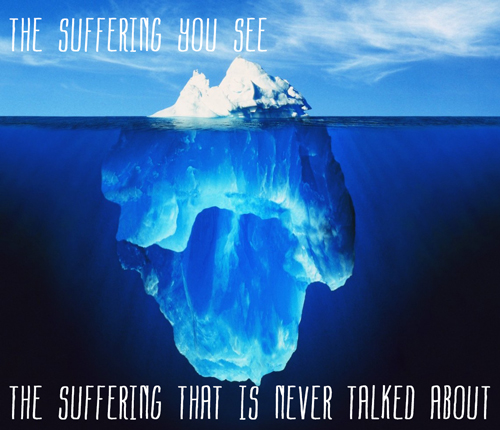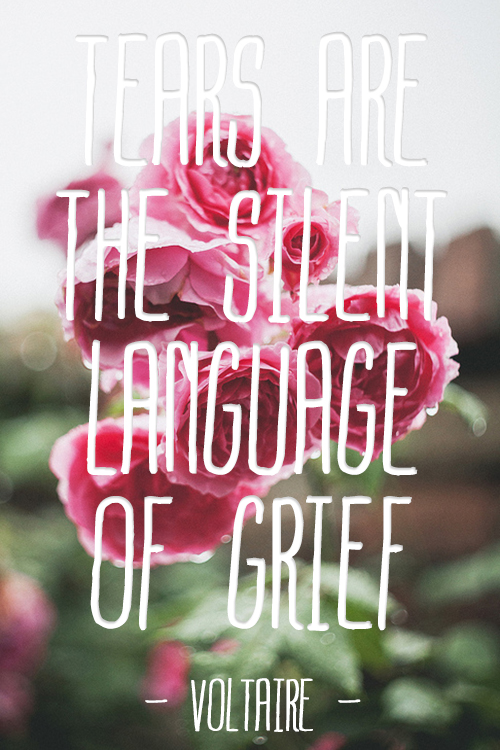
It's not easy to shop for a cremation urn. Often, choosing an urn is just one of many decision to be made during an incredibly stressful and shocking time. Grieving is a process which takes time and, at times, some outside direction and help.
Unfortunately, a lot of the help offered by well-meaning friends and family members has exactly the opposite effect. This can cause a grieving parent, spouse, or child to close up and turn inward rather than
Since we are in daily communication with people in various stages of grief, we've been able to collect some useful resourses on expressing and experiencing grief, as well as some links on how to act and respond to someone else's grief.
Whether you are processing grief yourself or know someone who is in the midst of grief, here are 12 helpful grief resources from around the web.
1. 64 Things I Wish Someone Had Told Me About Grief
Just like the title says, this is a list of 64 simple sentences which include profound truths about the grieving process and the feelings and thoughts you may experience. The post was compiled by the bloggers at What's Your Grief, which is a fabulously informative blog managed by two mental health professionals who specialize in bereavement, grief, and loss.
In addition to the list itself, there are hundreds of comments from the blog's readers adding their own thoughts and experiences. Definitely worth a read, and a great starting point for understanding grief.
2. 10 Myths About Grief
This list, from the National Funeral Directors Association, explores and explains ten of the most common myths about grief. Presented as quotes commonly heard from well-meaning but ill-informed sympathizers, this top-10 list is helpful for both the bereaved and those wishing to provide consolation.

3. Missing You: 22 Honest Quotes About Grief
The 22 grief quotes in this post on our blog are ideal for helping anyone in the midst of grief to express their thoughts and feelings. Sometimes it is really difficult to find the words to describe what you're going through, so these brief quotes provide a useful starting place.
Additionally, each quote (like the one to the right) is presented in elegant typography over beautiful imagery, which makes each image ideal for pinning onto a "Grief & Loss" Pinterest board, saving as a desktop background, or sharing on Facebook or other social media outlets.
4. LifeCare Guide to Helping Others Cope With Grief
This 21-page PDF booklet is a very readable and accessible introduction to helping others who are grieving. This short guide was produced by LifeCare and is packed with tips on what to say, what not to say, signs of depression, how to help co-workers, how to help children, and more. The "Suggested Reading" bibliography at the end is a great resource in itself, and includes many titles (including books for children) which you can probably find at your local library or order online.
5. 21 Ways to Help a Grieving Friend
Presented as a slideshow, these 21 tips on helping a friend in the midst of grief were adapted from Lori A. Pederson's ebook 25 Supportive Things You Can Do For Someone That Has Lost a Loved One, which is available as a free download here.
6. What to Say When There is Nothing to Say
Written by a mom who has experienced significant grief, this blog post simply radiates with wisdom and pathos. Much more than just a list of dos and don'ts, the author goes beyond most other tips by daring the give voice to the depth of her grief. From that place, she offers advice to those around the grieving individual on how to convey love and support during the difficult time, and beyond. She writes,
"So I offer what I have learned, in the hope that these thoughts may help some other aching souls to feel the touch of those who love them. If anything positive comes from what I share, it doesn’t make the loss of my son worth it—but it’s a small good thing nevertheless. It is only a pebble dropped into the edges of the ocean, but it makes some rings across the water.
I have 7 suggestions, which I have been turning over in my mind for months. I make these suggestions with some caution and more confidence. I would never claim to speak for every bereaved or broken person. Not everyone processes things the way I do. However, in the past couple of years I have heard and read quite a bit from people who have experienced catastrophic losses. And what I have gathered from them confirms what I think and feel myself. So I believe that my suggestions are broadly true for many of the people whose pain will cross your path.
We thought these 7 suggestions were so valuable that we culled out the most pointed quotes and re-presented the list on our blog in a shortened version. But we highly recommend reading the original, it is well-worth your time.
7. How to Love Someone Who is Grieving
This is a short, simple, and to-the-point list of 9 specific ways to show love to someone who is grieving. Written by the Paleo Mama, a homesteading, holistic, hippie, paleo(ish) mama of two, this post was written during the author's process of grieving the loss of her sister. Sometimes you just need a to-do list, and this fits the bill.
8. How to Write a Good Sympathy Card
Brief tips on writing a good sympathy card. In a similar vein, here are seven tips on how to write a condolence letter.
9. The Complete Guide to Sympathy Meals
One last way to help others in their grief - instead of trying (usually in vain) to offer words of comfort or helpful advice, the simple gesture of bringing a hot meal can be a very tangible way to show your love and support. Our guide to sympathy meals includes tips on organizing several weeks' worth of meals to be delivered after a funeral, directions on what to include in a well-rounded an helpful meal, and plenty of delicious recipes which can be stored in a freezer, reheated, or brought piping hot to their door.
10. GriefShare
GriefShare.org is a network of support groups to help you in your grief. There are groups which meet all over the US, and their homepage has a handy zip code lookup tool which will help you find a group that meets near you. Each meeting includes a well-produced seminar video which includes expert interviews, case studies, and reenactments which cover a variety of aspects of the grieving process. After the video, the group discusses the presentation together and reflects on how the topics can apply to their lives.
11. Creating a Memorial Space in Your Home
A loved one’s death will leave many things behind – photos, letters, trinkets, clothing, and much more. More than just the tangible stuff which surrounds us, a departed loved one will leave behind a lifetime of memories and a vast empty hole in the lives of those around them. One way to deal with the intagible effects of a family member’s death is to make use of the tangible things to create a memorial space in your home. This blog post talks about ideas for beginning your own memorial space.
12. Left Behind - A Memorial Project
Since each person processes grief in different ways, some individuals find it helpful to express their grief through writing, artwork, collages, and just about anything else. Some people start a blog, write poetry, or keep a journal. Others paint or sculpt or create a memorial montage video.
Jennifer Loeber, a photographer and artist, found a way to express her grief over the loss of her mother through a photography project entitled Left Behind. In this, she paired photographs of some of her mother's most mundane personal items alongside vintage photos of her mom. Jennifer writes,
"I found myself deeply overwhelmed by the need to keep even the most mundane of my Mom's belongings when she died suddenly this past February. Instead of providing comfort and good memories they became a source of deep sadness and anxiety and I knew the only way I would be able to move past that was to focus on a way to interact with them cathartically.
I had recently become active on Instagram and realized that utilizing the casual aspects of sharing on the app was a way to diminish my own sentimentality towards the objects my Mom left behind. Each image is paired with an archival image of her that speaks to its subject.
This is just one example of many in which a person's creativity is utilized in giving voice to their grief over the loss of a loved one. What might you do?

